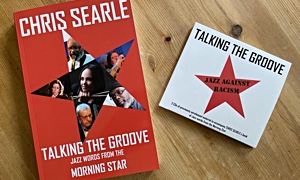Home » Jazz Articles » Book Review » MONK
MONK
Marlowe & Company (New York, 1997)
This is a biography with the flavor of a novel. Lacking any of the scholarly apparatus customary in a historical work — no index, footnotes, bibliography, discography, or acknowledgments — it nevertheless imposes a knowing and occasionally stylish sensibility on its treatment of the seminal jazz composer and pianist Thelonious Monk (1917 - 1982). To a large degree, though, it is less a biography than a meditation on Monk's life and music.
The facts are there, though: Monk's youth in the mid-town Manhattan neighborhood which now boasts Lincoln Center, and was home as well to the great stride pianist James P. Johnson, whose conception echoes faintly and intermittently in Monk's; his boyhood acquaintance with and later marriage to Nellie, who took care of all family affairs except for music; the bands, with Kenny Clarke as the music evolved towards bebop at the Harlem after-hours club Minton's, in the studios with Art Blakey and Sonny Rollins, at the Five Spot in Greenwich Village for a year-long gig with John Coltrane and then Johnny Griffin, the later tours and recordings with less renowned sidemen; his bouts with madness; his end as a recluse in the luxurious home of his patroness, Pannonica the Baroness.
The narrative is studded with tangents: a typology of record producers; why the saxophone came to symbolize jazz; the impact of the LP on recorded jazz; the agony of the long-lived jazz group:
Discouragement, depression, getting fed up, losing faith — strictly forbidden! Music, music, and more music! Shotgun marriage! Burning desire! Ordeal by fire! and many others. The telegraphic style seen in this excerpt, which de Wilde often employs, reminiscent of his compatriot, the great novelist Louis-Ferdinand Celine, can be an irritant, but often it provides a vivid sense of the experiences of Monk and his circle.
Similarly, the author's various musical exegeses alternate between the musicologically illuminating, as we expect from a jazz pianist turned author, and the merely impressionistic. Thus on the one hand he notes that in most cases any given tune keeps its tempo in each of Monk's recordings of it over his career. A page later, he is describing Monk's work on the 1950 "Bird and Diz" session exclusively with superlatives that give little sense of what the music actually sounds like: both Monk and the misplaced drummer Buddy Rich moving it well away from the usual environs of bebop, with its more facile pianists and less insistent drummers.
If de Wilde omits the perhaps significant fact, like Monk's late receipt of a Guggenheim award for composition, leaving such for what he dismisses as "official" biographies, he gets a flavor: the flavor of an African-American man who with brilliance and persistence, and a bread-winning wife, stuck it out until fame and fortune came, and then dissolved in seclusion. This tale of triumph and despair is appropriate for de Wilde's frenetic enthusiasm, and the reader will end with greater understanding of the life if not necessarily any enhanced appreciation of the music.
This review copyright (c) 1998 by Larry Koenigsberg.
< Previous
Rollin' and Tumblin'
Next >
Looking for Chet Baker
Comments
Tags
For the Love of Jazz
 All About Jazz has been a pillar of jazz since 1995, championing it as an art form and, more importantly, supporting the musicians who create it. Our enduring commitment has made "AAJ" one of the most culturally important websites of its kind, read by hundreds of thousands of fans, musicians and industry figures every month.
All About Jazz has been a pillar of jazz since 1995, championing it as an art form and, more importantly, supporting the musicians who create it. Our enduring commitment has made "AAJ" one of the most culturally important websites of its kind, read by hundreds of thousands of fans, musicians and industry figures every month.






















